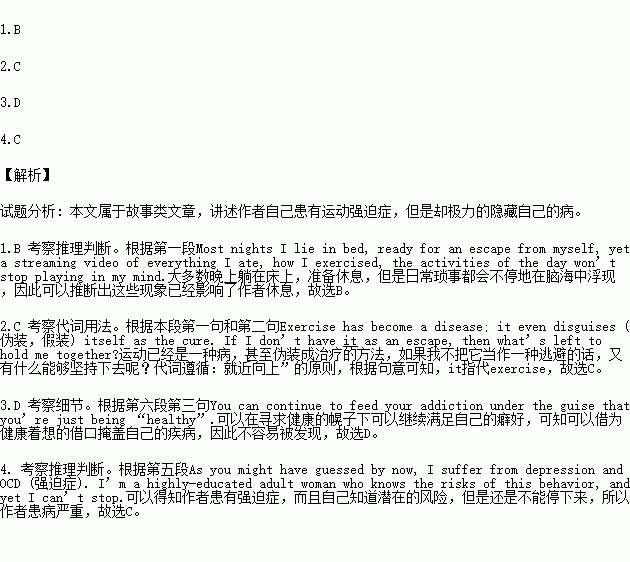题目内容
Most nights I lie in bed, ready for an escape from myself, yet a streaming video of everything I ate, how I exercised, the activities of the day won’t stop playing in my mind.
I pause. I breathe. I try to relax once again, but it doesn’t work.
When I’m not exercising — even if I’ve already exercised that day — I’m consumed with anxiety about my next workout. Will something come up and make me miss the gym? What about holidays when the gym is closed?
Exercise has become a disease; it even disguises (伪装,假装) itself as the cure. If I don’t have it as an escape, then what’s left to hold me together? Working out feels like the only way to calm myself, but as soon as I leave the gym or finish a walk, the whole cycle starts over again.
As you might have guessed by now, I suffer from depression and OCD (强迫症). I’m a highly-educated adult woman who knows the risks of this behavior, and yet I can’t stop.
As a society, we’re told over and over that it’s important to exercise. That’s what makes it so easy to keep this addiction a secret; it’s not as obvious as lighting up a cigarette. You can continue to feed your addiction under the guise that you’re just being “healthy”. I not only have to fight the nonstop thoughts in my head but also the “more exercise is better” messages I receive from the media every day.
For me, exercise has become a drug, which is a way to numb the pain I might feel. I wonder what it would be like to “have the problem” of not wanting to go to the gym. It still feels very far away.
Yet I know I can be stronger than this. I can break the cycle I’m in. I can tell my story so as to give up a piece of the secrecy that keeps me sick.
Because no, you don’t want my problem. And finally, neither do I.
1.When the author goes to bed, she___________.
A. can’t breathe normally B. can’t fall asleep
C. always feels hungry D. always feels tired
2.The underlined word “it” in paragraph 4 probably refers to ___________.
A. the gym B. disease C. exercise D. the cure
3. What is special about the addition to exercise?
A. It is popular among highly-educated people.
B. It is widely reported by the mass media.
C. It does little harm to health.
D. it is not easily discovered.
4.We know from the text that the author ____________.
A. is emotionless
B. lives far away from the gym
C. is seriously ill
D. has difficulty in keeping secrets

